Read stories below to learn how The Carter Center is improving the lives of women, children, and men in Latin America and the Caribbean.
By Paige Alexander, chief executive officer of The Carter Center
We at The Carter Center are horrified by the devastation in Ukraine. As we have helped other nations to rebuild after wars, we will continue waging peace. Learn more »
Barbara Smith, vice president of the Carter Center’s peace programs, says she was born to her line of work. Her mother is from Germany and taught her the value of international perspectives. Her father was in the military and ingrained in her the importance of service. Learn more »
 In the spring of 2019, staff members in the Carter Center’s Latin America and Caribbean Program traveled to Mérida, capital of Mexico’s Yucatán state, to present a report about Mexico’s human rights system.
Learn more »
In the spring of 2019, staff members in the Carter Center’s Latin America and Caribbean Program traveled to Mérida, capital of Mexico’s Yucatán state, to present a report about Mexico’s human rights system.
Learn more »
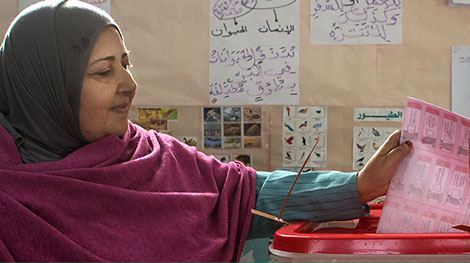 Building a peaceful world involves more than ending war. A peaceful world is one in which justice thrives, everyone’s rights are respected, and people have access to essentials. The Carter Center has dozens of programs and projects dedicated to making the dream of peace a reality. This slide show explores a handful of them.
Learn more »
Building a peaceful world involves more than ending war. A peaceful world is one in which justice thrives, everyone’s rights are respected, and people have access to essentials. The Carter Center has dozens of programs and projects dedicated to making the dream of peace a reality. This slide show explores a handful of them.
Learn more »
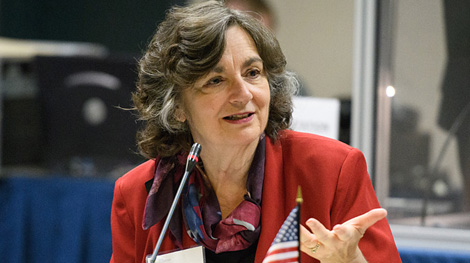 Jennie Lincoln’s career in the Carter Center’s Latin America and Caribbean Program has allowed her to be part of some incredible moments.
Learn more »
Jennie Lincoln’s career in the Carter Center’s Latin America and Caribbean Program has allowed her to be part of some incredible moments.
Learn more »
By Jake Turner, intern, Latin America and Caribbean Program
As an intern in the Latin America and Caribbean Program, I had the opportunity to be part of Colombia’s domestic election observation to witness Colombians voting abroad on Oct. 2 in a plebiscite to approve the peace accord between the government and the Marxist rebel group FARC. Our assignment was to observe the vote at the consulate in Atlanta. Learn more »
On Sept. 15, members of the Center’s Americas Program traveled to Bogotá, Colombia, for the launch of Trayectoria Institucional de los DDH en Colombia: Retos para Tiempos de Paz, a new publication produced by The Carter Center. Learn more »
For more than 50 years, Colombia has been plagued by civil war. The fighting forced more than 5 million people from their homes and claimed the lives of more than 200,000, according to most reports. But finally, after four years of negotiations, peace is at hand. The Carter Center has been working behind the scenes in Colombia to help prepare for life after war. Learn more »
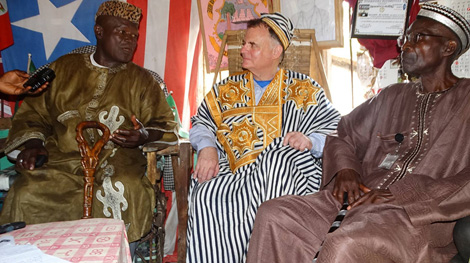 Jordan Ryan, vice president for peace programs, may be relatively new to The Carter Center, but his connection to President and Mrs. Carter dates back to the ’70s.
Learn more »
Jordan Ryan, vice president for peace programs, may be relatively new to The Carter Center, but his connection to President and Mrs. Carter dates back to the ’70s.
Learn more »
Former U.S. President Jimmy Carter received back-to-back honors this week in appreciation of his efforts to promote peace and human rights. Learn more »
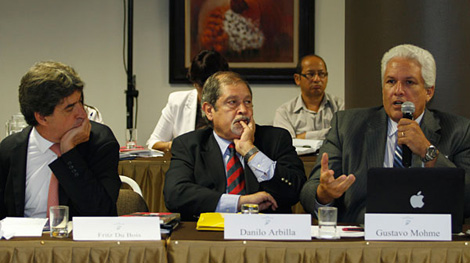 Peru's media landscape was shaken last year when El Comercio — one of Peru's oldest and most influential newspapers — acquired a majority stake in the media company Epensa. In response, El Comercio's biggest rival, La República, filed a lawsuit alleging monopolistic practices.
Learn more »
Peru's media landscape was shaken last year when El Comercio — one of Peru's oldest and most influential newspapers — acquired a majority stake in the media company Epensa. In response, El Comercio's biggest rival, La República, filed a lawsuit alleging monopolistic practices.
Learn more »
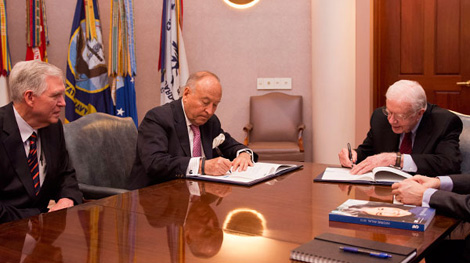 The Carter Center thanks CAF – Development Bank of Latin America – for renewing its support of our Americas Program work to strengthen peace, dialogue, democracy, and human rights in the Western Hemisphere.
Learn more »
The Carter Center thanks CAF – Development Bank of Latin America – for renewing its support of our Americas Program work to strengthen peace, dialogue, democracy, and human rights in the Western Hemisphere.
Learn more »
By Dr. Jennifer McCoy, director, Americas Program.
Panama’s elections were full of contradictions and tensions. Defying the polls, the winning candidate, Juan Carlos Varela, was the sitting vice president estranged from the president and running in opposition. With the possibility of the governing party continuing in office for the first time since the ouster of Manuel Noriega in 1990, fears of a growing concentration of power contributed to Panamanians rejecting the party that had led the highest economic growth rates in the hemisphere and a president with over 60 percent approval ratings. Learn more »
Thanks to the generosity of Dr. Robert Pastor and his wife, Margy, a fellowship is now available to support the work and study of a summer fellow in the Carter Center’s Americas Program. The founder and former director of the Americas Program, Dr. Pastor was advisor for Latin American affairs on the National Security Council in the Carter White House. Learn more »
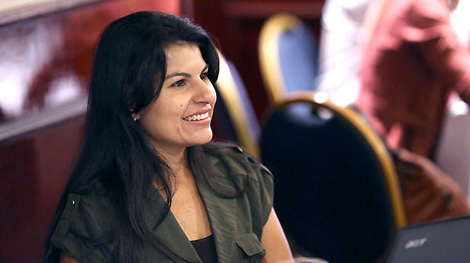 The Carter Center is encouraging less partisan and more professional media reporting on Venezuela's electoral process through a series of workshops ahead of the country's Oct. 7 presidential election, offering one of the few spaces where journalists from diverse media participate together in the polarized society.
Learn more »
The Carter Center is encouraging less partisan and more professional media reporting on Venezuela's electoral process through a series of workshops ahead of the country's Oct. 7 presidential election, offering one of the few spaces where journalists from diverse media participate together in the polarized society.
Learn more »
A group of former leaders and human rights experts serve as a watchdog to threats against democratic stability in the Americas and as a voice to strengthen, promote, and protect democracy and human rights. The group aims to bolster the effectiveness of the Inter-American Democratic Charter, approved on Sept. 11, 2001. Learn more »
Misunderstandings and tensions between Andean countries (Bolivia, Colombia, Ecuador, Peru, and Venezuela) and the United States are common, and often reinforced or made worse by charged, politicized reporting in media stories related to these countries. Learn more »
The Andean-U.S. Dialogue Forum, a citizens' forum created to identify and contribute solutions to multilateral problems and tensions among the Andean countries (Bolivia, Colombia, Ecuador, Peru, and Venezuela) and the United States, has issued a report outlining a common agenda to improve cooperation among the nations. Learn more »
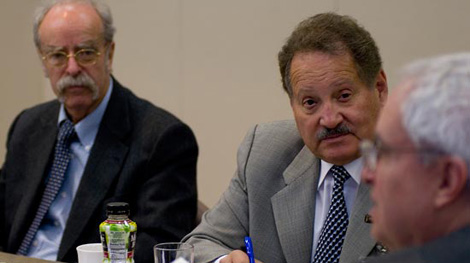 For veteran journalist Raúl Novillo Alarcón, navigating the streets of La Paz, Bolivia, is easier than keeping pace with the country's political roadmap. "This is a difficult time for journalism in Bolivia," he said.
Learn more »
For veteran journalist Raúl Novillo Alarcón, navigating the streets of La Paz, Bolivia, is easier than keeping pace with the country's political roadmap. "This is a difficult time for journalism in Bolivia," he said.
Learn more »
The Andean-U.S. Dialogue Forum met in Lima, Peru, on June 1-2 to develop a common agenda to address problematic issues among the represented countries. The forum, which consists of influential citizens from a variety of sectors within each country, is designed to provide crucial support and reinforcement of diplomatic efforts through a civil society process. Learn more »
A series of experts, including Carter Center Americas Program Director Jennifer McCoy and former Latin American leaders, will convene on March 15 at Georgia State University (GSU) to analyze recent democratic crises in the region, including the Honduran coup and recent events in Bolivia, Ecuador, Nicaragua, and Venezuela. Learn more »
For the past two days at The Carter Center, influential nongovernmental participants from the United States and the five Andean countries of Venezuela, Colombia, Ecuador, Peru, and Bolivia have gathered for a dialogue aimed to strengthen the historically difficult U.S.-Andean relations and cooperation. Learn more »
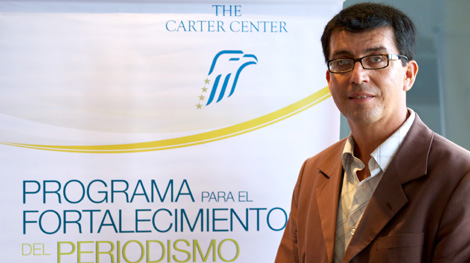 For Jordan Bracho, editor-in-chief at Telesur TV in Venezuela, attending The Carter Center "Journalism Beyond Print" workshop in August 2009 led to an immediate improvement in his work and allowed him to develop relationships with colleagues that he wouldn't have otherwise been able to in Venezuela's current media environment.
Learn more »
For Jordan Bracho, editor-in-chief at Telesur TV in Venezuela, attending The Carter Center "Journalism Beyond Print" workshop in August 2009 led to an immediate improvement in his work and allowed him to develop relationships with colleagues that he wouldn't have otherwise been able to in Venezuela's current media environment.
Learn more »
Join the Carter Center's Deborah Hakes, assistant director of public information, on the ground in Bolivia, as she blogs daily through Dec. 7 about the presidential and legislative elections, their importance for the Latin American country, and the Carter Center's role in the process. Learn more »
South American neighbors Ecuador and Colombia have a contentious recent history because of strains along their shared border, but seeing the other's point of view has become easier for key citizens participating in the Carter Center's dialogue process between both countries. Learn more »
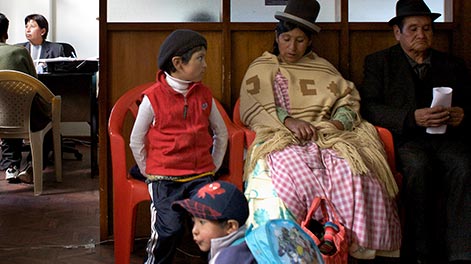 A family of four waits outside Rita Jimenez Huancollo's wood-paneled office at the Integrated Justice Center (CIJ) in La Paz, Bolivia, husband and wife with eyes cast down, he folding and unfolding papers and she glancing sideways every so often to quietly encourage their children to sit patiently.
Learn more »
A family of four waits outside Rita Jimenez Huancollo's wood-paneled office at the Integrated Justice Center (CIJ) in La Paz, Bolivia, husband and wife with eyes cast down, he folding and unfolding papers and she glancing sideways every so often to quietly encourage their children to sit patiently.
Learn more »
 In Bolivia, political disputes often escalate to the brink of conflict. One of the poorest countries in the Western Hemisphere, Bolivia's ethnic and cultural diversity, as well as struggles over natural resources, fuel strong social and economic tensions.
Learn more »
In Bolivia, political disputes often escalate to the brink of conflict. One of the poorest countries in the Western Hemisphere, Bolivia's ethnic and cultural diversity, as well as struggles over natural resources, fuel strong social and economic tensions.
Learn more »
Dr. Jennifer McCoy, Director, Americas Program, takes your questions. Learn more »
 Although about one half of all the countries in the Americas now have some form of access to information legislation, and almost all of the remaining countries are considering establishing a statutory right to information, there remain a number of critical challenges. In many countries, implementation and enforcement of the law has been weak. In other places there are signs of backsliding where once vibrant laws are now politicized or ineffectual; and in all cases there is a need to broaden and deepen the usage of the right to information.
Learn more »
Although about one half of all the countries in the Americas now have some form of access to information legislation, and almost all of the remaining countries are considering establishing a statutory right to information, there remain a number of critical challenges. In many countries, implementation and enforcement of the law has been weak. In other places there are signs of backsliding where once vibrant laws are now politicized or ineffectual; and in all cases there is a need to broaden and deepen the usage of the right to information.
Learn more »
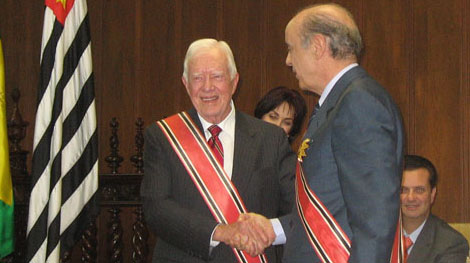 Dr. Jennifer McCoy, director of the Carter Center's Americas Program, is traveling with former U.S. President Jimmy Carter as a member of the Carter Center delegation to Ecuador, Peru, Bolivia, and Brazil from April 27 to May 4, 2009. Read more about the trip and read her blog entries below.
Learn more »
Dr. Jennifer McCoy, director of the Carter Center's Americas Program, is traveling with former U.S. President Jimmy Carter as a member of the Carter Center delegation to Ecuador, Peru, Bolivia, and Brazil from April 27 to May 4, 2009. Read more about the trip and read her blog entries below.
Learn more »
The Carter Center works toward the collective protection and promotion of meaningful democracy in the Western Hemisphere. The Center strives to enhance the quality of democracy and its ability to improve the lives of individuals in three areas: Learn more »
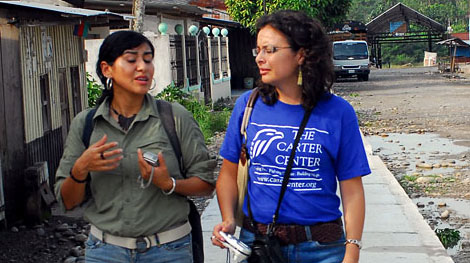 The Carter Center conducted a conflict–related development analysis in two towns along the Ecuador northern border. The analysis focuses on development in the border zone, including access to justice and human rights, citizen security, and youth and social inclusion, and will serve as input for the creation of public policies for development in the northern border zone by Ecuador’s government.
Learn more »
The Carter Center conducted a conflict–related development analysis in two towns along the Ecuador northern border. The analysis focuses on development in the border zone, including access to justice and human rights, citizen security, and youth and social inclusion, and will serve as input for the creation of public policies for development in the northern border zone by Ecuador’s government.
Learn more »
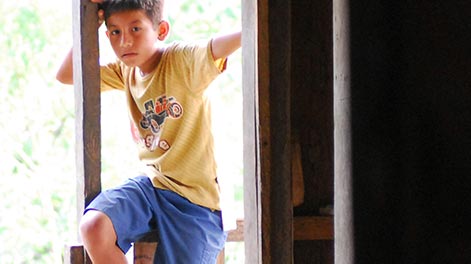 Buenaventura Morales has a kind face worn weary from life, and friendly eyes that hide the depression plaguing him since he fled his native Colombia after massacres to his village in 2004. His wife died along the way, and he said he feels unable to support his four children by himself; he can't find a job in this poor border region of Ecuador. He plans to rent a small plot of land nearby to grow rice and trade it among the large refugee community here. Life on the border between Ecuador and Colombia is tough, and complicated.
Learn more »
Buenaventura Morales has a kind face worn weary from life, and friendly eyes that hide the depression plaguing him since he fled his native Colombia after massacres to his village in 2004. His wife died along the way, and he said he feels unable to support his four children by himself; he can't find a job in this poor border region of Ecuador. He plans to rent a small plot of land nearby to grow rice and trade it among the large refugee community here. Life on the border between Ecuador and Colombia is tough, and complicated.
Learn more »
In this Q&A, the Carter Center's Laura Neuman, assistant director of the Americas Program and Access to Information Project manager, shares her insights. Learn more »
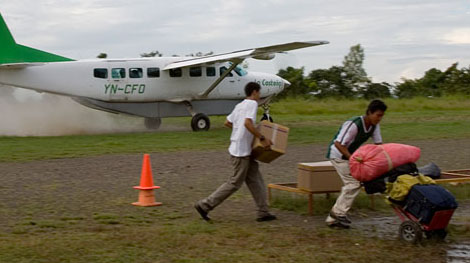 The Carter Center deployed a 62-member delegation to observe Nicaragua’s 2006 election. Carter Center observers David Evans and Sandra Flores, a French citizen, were based in Rio San Juan, which shares its river and border with Costa Rica. They arrived in the region via small plane on a muddy landing strip.
Learn more »
The Carter Center deployed a 62-member delegation to observe Nicaragua’s 2006 election. Carter Center observers David Evans and Sandra Flores, a French citizen, were based in Rio San Juan, which shares its river and border with Costa Rica. They arrived in the region via small plane on a muddy landing strip.
Learn more »
In this Q&A, Dr. Shelley McConnell, senior associate director of the Carter Center’s Americas Program, discusses the groundbreaking media mapping project: its impetus, implementation, and hoped-for impact on democratization in the Americas. Learn more »
Governments have had a difficult time addressing the needs of the people, particularly low-income and marginalized peoples. As a result, satisfaction with democratic performance is eroding, even while support for the principles of democracy remains strong. High crime rates, poor public services, corruption, and chronic unemployment have made the promises of strongmen and populist candidates attractive to many voters. Learn more »
At the conclusion of the Carter Center’s work to help resolve Venezuela’s political crisis, Dr. Jennifer McCoy, director of the Center’s Americas Program, traveled to Caracas Feb. 24, 2005, to present the Center’s final report on the presidential referendum process. Before leaving, she and former Carter Center Caracas Representative Francisco Diez talked about the Center’s work there for the past two and a half years and the future of Venezuela. Learn more »
Twenty-five years ago, then U.S. President Jimmy Carter signed the landmark U.S. Foreign Corrupt Practices Act into law, making it illegal for American companies to bribe or pay excessive "fees" to conduct business in another country. Today, the Emory University-affiliated Carter Center continues his work through its Council for Ethical Business Practices. Learn more »
Former U.S. President Jimmy Carter made history in May 2002 as the first United States president, former or sitting, to visit Cuba since Fidel Castro assumed power in 1959. Among those accompanying him on The Carter Center delegation was Dr. Jennifer McCoy (pictured at left with Cuban healthcare workers), director of the Americas Program at The Carter Center and associate professor of political science at Georgia State University. A special trip de-briefing with Dr. McCoy follows. Learn more »
The following is an excerpt and translation from the Cuban Newspaper, Granma. President Carter’s comments are a direct transcription from a videotape of his speech to faculty and students at the University of Havana, Cuba, on May 14, 2002. Where President Carter’s comments were inaudible, a translation of the interpreter’s translation was substituted. Therefore, it is important to note that this re-translation may result in some variation from what President Carter actually said. Learn more »